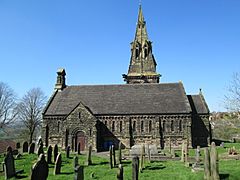St Anne's Church, Brown Edge facts for kids
Quick facts for kids Church of St Anne |
|
|---|---|

Viewed from the south
|
|
| 53°4′59.6″N 2°8′34.6″W / 53.083222°N 2.142944°W | |
| OS grid reference | SJ 905 540 |
| Location | Brown Edge, Staffordshire |
| Country | United Kingdom |
| Denomination | Church of England |
| History | |
| Dedication | Saint Anne |
| Architecture | |
| Heritage designation | Grade II |
| Designated | 15 December 1986 |
| Architect(s) | J. C. Trubshaw Ward and Son |
| Completed | 1854 |
| Administration | |
| Diocese | Diocese of Lichfield |
St Anne's Church is a special church located in Brown Edge, a village in Staffordshire, England. It belongs to the Church of England, which is also known as Anglicanism. This church is considered an important historical building. It has a "Grade II listed" status, meaning it's protected because of its history and architecture.
Contents
A Look Back: The Church's Story
How St Anne's Church Began
In the early 1800s, many people living in Brown Edge were miners. They worked hard in coal mines like Chatterley Whitfield, which were not far from their village. Some generous people, called benefactors, helped make the church possible. These benefactors gave land for the church and also helped pay for its construction. Among them were the owners of the mines, especially a mine-owner named Hugh Henshall Williamson.
Building the Church
The main part of St Anne's Church was designed by an architect named J. C. Trubshaw. It was built in 1844 using stone found nearby. The church was officially opened and blessed on June 1, 1844. This special ceremony was performed by the Bishop of Lichfield, John Lonsdale.
The Church Tower
A few years later, in 1854, a tall tower was added to the church. This tower also has a pointed top, called a spire. It was built by a company known as Ward and Son. The tower stands on the north-east side of the church. Its design is described as "Iconoclastic Romanesque," which means it has a unique style inspired by old Romanesque architecture.
See Also
- Listed buildings in Brown Edge

